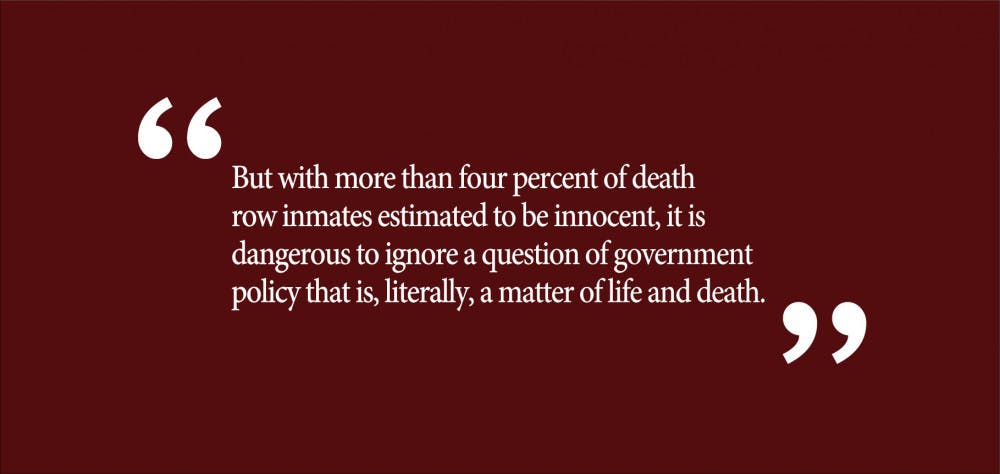The question of whether our government should be in the business of putting violent criminals to death, once a hotly debated social issue, has been strangely absent from political discourse in recent years. The era of hyper-partisan politics and the Trump presidency has embroiled our campus with issues like climate change and immigration. But with more than four percent of death row inmates estimated to be innocent, it is dangerous to ignore a question of government policy that is, literally, a matter of life and death. On one hand, death penalty supporters say it is a deterrent for the worst crimes. While I have no sympathy for murderers and capital punishment is legal in most states, there are plenty of reasons to oppose government executions. The death penalty is inordinately expensive, it is an unconvincing deterrent and it undoubtedly kills innocent people.
In the first place, all available evidence shows that charging and administering the death penalty is more expensive than a life sentence. For example, in 2008, the state of California estimated that its capital punishment-related costs were at least 11 times more than those of lifetime incarceration. This should come as no surprise. Death penalty trials are much longer and more meticulous than trials that could only lead to imprisonment.
Government expenses continue rising after a conviction. Those sentenced to death get ample opportunity — rightfully so, given the finality of it — to appeal their sentence. All the while, taxpayers fund their food, health care and residence. In fact, the average tenure on death row was close to 15 years in 2010, and seems to be increasing. And when the time for execution finally comes, just a single dose of lethal injection may cost over $16 thousand. Nonetheless, cost is just one of the problematic externalities of the death penalty.
Contrary to what many of its proponents believe, capital punishment does not appear to be a strong disincentive for violent crime. Admittedly, the deterrence argument is not unreasonable — most people do not want to be executed. However, I wonder if all those who kill think about the consequences when committing the act. Murder rates were not noticeably affected by the outcome of the U.S. Supreme Court’s Furman v. Georgia case, which declared many state death penalty schemes unconstitutional, or Gregg v. Georgia, which then effectively reversed the former decision, and affirmed the death penalty. The most dedicated research on deterrence tells a similar story: The effects of the death penalty on crime rates are inconclusive.
The third problem with the death penalty is the moral disaster that a wrongful execution entails. To be clear, I do not want to argue that murderers are being wrongfully executed. It is neither a cruel nor unusual punishment to end the life of someone who intentionally takes someone else’s with malice. At the same time, the American legal system is imperfect. No judge or jury can be expected to decide every case correctly, so it is not a shock that about one in 25 death sentences is handed down to an innocent person. While many of these wrongly convicted cases result in adjusted sentences or exoneration, it is likely that innocent people have been executed in the modern era United States.
The death penalty is unacceptable if it causes the death of even one innocent person. If a life sentence is incorrectly handed down, the accused can be released from prison and compensated for the injustice they have been dealt, but no government can bring the dead back to life. That certainly was the case for Carlos DeLuna, whom the state of Texas executed on Dec. 7, 1989, for a murder he (by almost all available evidence) did not commit. If a single case is not terrifying enough, the Death Penalty Information Center maintains a list of possibly innocent people executed in the U.S. between 1989 and 2019.
Advocates of capital punishment might say that any prison sentence is irreversible, not just the death penalty. It is true, after all, that we all have a finite amount of time to live, and no person can turn back that clock. But taking time from an innocent individual is a far lesser evil than taking their life. Moreover, it is futile and expensive to enforce the death penalty, which isn’t a surefire deterrent, when there are cheaper punishments that are more effective.
The death penalty should be abolished and replaced with life without parole. Such a system would be far easier to adjudicate, sparing taxpayers the cost of expensive drug cocktails and appellate trials. And most importantly, in addition to giving up on a non-existent deterrent factor, abolition of the death penalty would keep our government out of the business of executing potentially innocent people.
Donnie Sahyouni ’21 can be reached at donnie_sahyouni@brown.edu. Please send responses to this opinion to
letters@browndailyherald.com and op-eds to opinions@browndailyherald.com.





